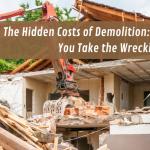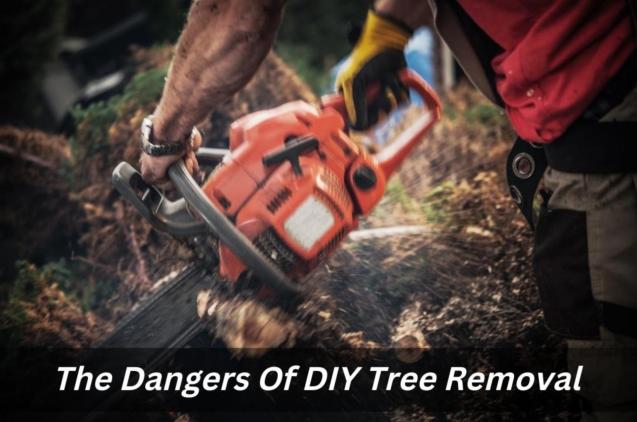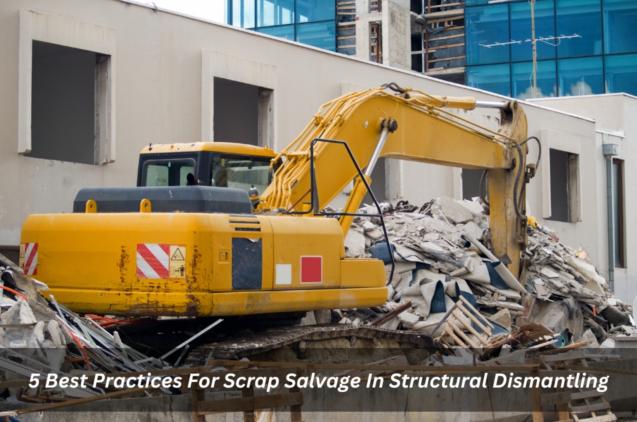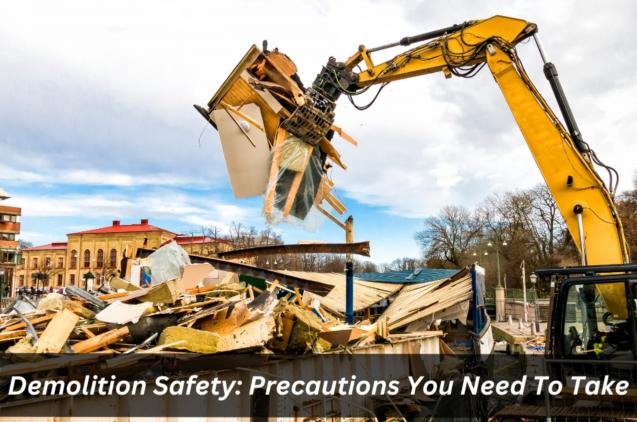
The Hidden Costs of Demolition: Before You Take the Wrecking Ball
By Watson Site Services|May 06, 2024
Hold on there with the hammer! Before you go all demo crew on your house, there are some things to think about. While demolition companies might advertise affordable cost to demolish a house, there can be hidden expenses that can leave your wallet weeping. Let's break down these hidden costs and suss out ways to keep them from crashing the party.
The usual crew: Permits and utilities
Every council has its own rules, so you'll need to track down demolition permits before the crew gets there. Getting these can vary in cost, so factor in some extra cash – delays or unexpected requirements can sneak in and whack you with extra fees. Also, gotta ditch the old utilities like electricity and water. Disconnecting them might seem like a minor cost, but those fees can add up, especially depending on the setup.
Nasty surprises: Asbestos and lead oh my!
Older houses can be like hidden treasure chests – sometimes the treasure is actually trouble. Asbestos or lead paint can be hiding in the walls, just waiting to cause problems. If these nasties are there, they'll need to be taken care of by pros before the demolition can even begin. This can cost a bunch, so it's super important to get someone to check things out first to see if there are any surprises.
The not-so-obvious: Surprises and beyond
Imagine the demolition is underway. Dust flies, bricks tumble – everything seems sweet. But then, the crew hits a snag. Maybe there's a hidden structural issue nobody knew about. Dealing with these surprises can mean more time and moolah on the project.
Don't forget about the leftover mess – the demolition debris. The amount and type of material will affect the final cost. Think bricks, concrete, and timber – all gotta be sorted, hauled away, and disposed of responsibly.
In some cases, the site might need some extra TLC before you can build your new digs. This could involve levelling the ground, removing old tree stumps, or even more asbestos removal if they find any sneaky bits during demolition.
Environmental impact: Consider the demolition debris
So how can you reduce the environmental impact of your demolition project? Here are some ways to keep your project green:
In some cases, demolition might not be your only option. Depending on the condition of the building and your end goal, there could be alternative ways to achieve your vision. Here are a couple of options to consider:
So how do you stop these hidden costs from turning your demolition project into a disaster zone for your wallet? Here's a battle plan:
The usual crew: Permits and utilities
Every council has its own rules, so you'll need to track down demolition permits before the crew gets there. Getting these can vary in cost, so factor in some extra cash – delays or unexpected requirements can sneak in and whack you with extra fees. Also, gotta ditch the old utilities like electricity and water. Disconnecting them might seem like a minor cost, but those fees can add up, especially depending on the setup.
Nasty surprises: Asbestos and lead oh my!
Older houses can be like hidden treasure chests – sometimes the treasure is actually trouble. Asbestos or lead paint can be hiding in the walls, just waiting to cause problems. If these nasties are there, they'll need to be taken care of by pros before the demolition can even begin. This can cost a bunch, so it's super important to get someone to check things out first to see if there are any surprises.
The not-so-obvious: Surprises and beyond
Imagine the demolition is underway. Dust flies, bricks tumble – everything seems sweet. But then, the crew hits a snag. Maybe there's a hidden structural issue nobody knew about. Dealing with these surprises can mean more time and moolah on the project.
Don't forget about the leftover mess – the demolition debris. The amount and type of material will affect the final cost. Think bricks, concrete, and timber – all gotta be sorted, hauled away, and disposed of responsibly.
In some cases, the site might need some extra TLC before you can build your new digs. This could involve levelling the ground, removing old tree stumps, or even more asbestos removal if they find any sneaky bits during demolition.
Environmental impact: Consider the demolition debris
So how can you reduce the environmental impact of your demolition project? Here are some ways to keep your project green:
- Snag some cool stuff: Before they bust down the walls, see if there are any doors, windows, cabinets, or appliances you can save. This saves you cash and keeps them out of landfills. Score!
- Recycle what you can't reuse: Lots of building materials get a second life! Concrete, brick, and metal can all be recycled. Find a demolition company that's cool with recycling the leftover mess. Win-win!
- Find a new home for demolition materials: There may be companies that specialise in deconstructing buildings rather than demolishing them. This allows them to carefully remove and sell usable materials.
In some cases, demolition might not be your only option. Depending on the condition of the building and your end goal, there could be alternative ways to achieve your vision. Here are a couple of options to consider:
- Revamp it: If your house isn't a total disaster, a sweet renovation could totally transform it. Think new floors, a funky kitchen, or maybe incorporating trendy bathroom designs. Revamping can be way more eco-friendly than demolition, and depending on what you do, it might not cost as much either.
- Deconstruction crew, assemble!: This is the opposite of demolition. Instead of going in with a big bang, a deconstruction crew carefully takes everything apart, piece by piece. This way, all the cool old stuff from your house (doors, windows, maybe even some beams!) gets saved and can be used in new projects. Pretty neat, right?
So how do you stop these hidden costs from turning your demolition project into a disaster zone for your wallet? Here's a battle plan:
- Shop around and compare quotes: Demolition companies are like pizza places – gotta get some quotes before you decide! Talk to a few different ones and get breakdowns of all the costs, not just the headline price for knocking things down. This way, you can pick the best deal for your project. A licensed pro can give you a heads-up on what hidden nasties might be lurking.
- Get a pro to peek before you wreak: Before the demolition crew rolls in, have a professional inspection done on the property. This will help uncover any hidden structural problems or hazardous materials that could seriously impact the cost.
- Budget for the unexpected: Demolition can get really messy, even with a plan. Adding a buffer to your budget, like 10-15%, helps roll with the punches if anything unexpected pops up.



